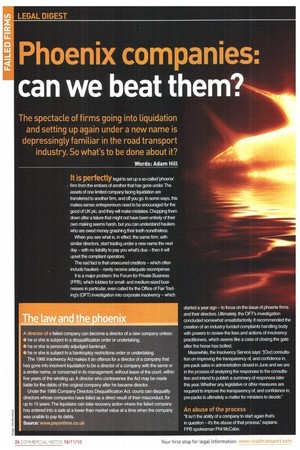Phoenix companies: can we beat them?
Page 26

Page 27

If you've noticed an error in this article please click here to report it so we can fix it.
The spectacle of firms going into liquidation and setting up again under a new name is depressingly familiar in the road transport industry. So what's to be done about it?
Words: Adam Hill
It is perfectly legal to set up a so-called 'phoenix' firm from the embers of another that has gone under. The assets of one limited company facing liquidation are transferred to another firm, and off you go In some ways, this makes sense. entrepreneurs need to be encouraged for the good of UK plc, and they will make mistakes. Chopping them down after a failure that might not have been entirely of their own making seems harsh, but you can understand hauliers who are owed money gnashing their teeth nonetheless When you see what is, in effect, the same firm, with similar directors, start trading under a new name the next day with no liability to pay you what's due •then it will upset the compliant operators.
The sad fact is that unsecured creditors which often include hauliers rarely receive adequate recompense It is a major problem. the Forum for Private Business (FPB). which lobbies for smalland medium-sized businesses in particular, even called for the Office of Fair Trading's (OFF) investigation into corporate insolvency which
started a year ago to focus on the issue of phoenix firms and their directors Ultimately, the Ofl-'s investigation concluded somewhat unsatisfactorily. It recommended the creation of an industry-funded complaints handling body with powers to review the fees and actions ot insolvency practitioners, which seems like a case of closing the gate after the horse has bolted
Meanwhile, the Insolvency Service says: "[Our] consultation on improving the transparency of, and confidence in, pre-pack sales in administration closed in June and we are in the process of analysing the responses to the consultation and intend to publish a summary of responses later this year. Whether any legislative or other measures are required to improve the transparency of, and confidence in, pre-packs is ultimately a matter for ministers to decide"
An abuse of the process
"It isn't the ability of a company to start again that's in question it's the abuse of that process," explains FPB spokesman Phil McCabe. Bad debts can be the death knell for many a small — and not so small — haulier. In a survey, 25% of FPB members have cited cash flow worries as a result of payment problems as their biggest headache And 42% of them reported a deterioration in payments, including failed payments arising from debtors becoming insolvent.
The law should be tightened to prevent suppliers going unpaid while directors can look after themselves and start up again down the road," continues McCabe. 'We need to prevent 'serial' phoenix companies:' Brian Goodall, founder of Aberdeen-based Pegasus Express, agrees. "Phoenix firms are becoming more prevalent," he says. 'We've had customers who have gone into receivership today [owing us money] and are expecting us to deliver their work tomorrow. It's pretty infuriating:'
Goodall does not argue with the logic of allowing companies to restart under a different guise. But he points out that the climate of uncertainty caused by directors being able — legally — to ignore their obligations to creditors is creating a knock-on effect for firms like his -It's bad and
getting worse: he says. Our suppliers are expecting extra payments, deposits and so on."
In the road transport industry, phoenix firms can also ring alarm bells, with people iustifiably concerned about safety. Goodall questions how VOSA and the Traffic Commissioners (TCs) square the fact that a company that has failed to keep itself going is to be relied upon as a new entity to maintain its vehicles properly "A poor financial record and a poor compliance record can often go hand-in-hand," agrees Freight Transport Association chief economist Simon Chapman.
`TCs have an important role in supporting fair play and helping ensure that new businesses entering the sector take both of these responsibilities seriously' The fundamental problem, however, remains "There needs to be some kind of credit protection," Goodall insists
Hauliers might be surprised to find that they have an unlikely ally in insolvency practitioner Paul Brindley of Midlands Business Recovery. 'Creditors are not protected enough:. he says 'The only law that protects them relates to fraud — other than that, they are on their own:'
Creditors carry the risk
Part of the problem is the low barrier to business entry Brindley believes:You can set up a limited company at the age of 18 for £30— less than the price of a good night out," he says. "Anyone can do it. just put a quid in as share capital and off you go. Directors are being given the privilege of limited liability and then getting away scot free — all the risk is being carried by their creditors."
His proposal is to ban someone from being a director for two years if their first firm — and subsequent phoenix firm — both fail within five years. They would not be banned from business per se for that period, but would not be able to rely on creditors as director of a limited liability entity.
Brindley thinks that in the past cash has been too readily available so wants a minimum share capital requirement to be brought into law. What about £5,0007' he asks That would concentrate the mind."
But before hauliers tired of bad debts start cheering, there is a word of caution. 'The problem is that the government has no political will for this," sighs Brindley. "Nothing will happen unless the law is changed.And there are choppy economic waters ahead. "Things are almost more dangerous for firms coming out of the recession," McCabe warns.
Goodall has been around long enough to have seen two recessions before this one — he actually set the company up during one but thinks that this is the worst yet. Phoenix firms are not going to go away any time soon so just be very careful how you approach dealing with them




































































































































